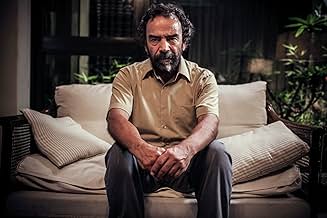On a mountain top a solitary woman overlooks Lima at night, its bright office towers and sprawling red brick slums, and cries. A taxi driver seeks to bolster his pitiful income through blackmail. A former colonel in the Peruvian military who once fought the fire of the Shining Path insurgency with a fierce fire of his own, now fights senility. Each of them stands as a gatekeeper to secrets that might be better left unknown. Their experiences are emblematic of the city, country and continent as a whole; the past is very much a part of the present.
The film touches upon an important subject. Some Peruvians treasure the fear and rage of war. It is all they have known, or want to know. Others dream of peace, prosperity and a freedom as vibrant as that enjoyed by the Miraflores district hang gliders along the ocean coast. Many more are caught in the middle. All, whether they acknowledge it or not, are haunted and hobbled by a legacy of violence. The consequences and causes of this violence, much of it socioeconomic, are important to Latin Americans and to countries including the United States who helped instigate it. A conversation is long overdue. As with the characters in the film, who attempt to talk about the horrors of the past, we may not get the reaction we expected.
There are some amazing and heart-rending scenes including Celina's emotional speech in Quechuan, the hang gliders over the ocean, and Magallanes' insidious brother getting hold of a victim, that might have been more effective if there was more money available to the filmmakers. Of course, additional funds might have caused the scenes to backfire. The acting is a little clunky but believable. Seen at the 2016 Miami International Film Festival.

![Ver Tráiler [OV]](https://m.media-amazon.com/images/M/MV5BYzI2MDcyNTktYzc2OC00OTZhLWIzNTUtZGZjZThiNzMwMTY4XkEyXkFqcGdeQXRyYW5zY29kZS13b3JrZmxvdw@@._V1_QL75_UX500_CR0)
























